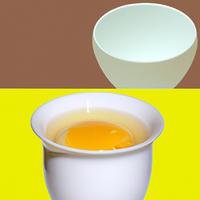
1 serving (138 grams) contains 103 calories, 11.8 grams of protein, 5.1 grams of fat, and 1.2 grams of carbohydrates.

Log this food in SnapCalorie

Nutrition Information
Calories |
206.0 | ||
|---|---|---|---|
% Daily Value* |
|||
| Total Fat | 10.2 g | 13% | |
| Saturated Fat | 3.2 g | 16% | |
| Polyunsaturated Fat | 0 g | ||
| Cholesterol | 372 mg | 124% | |
| Sodium | 284.0 mg | 12% | |
| Total Carbohydrates | 2.4 g | 0% | |
| Dietary Fiber | 0 g | 0% | |
| Sugars | 2.2 g | ||
| protein | 23.6 g | 47% | |
| Vitamin D | 82.0 mcg | 410% | |
| Calcium | 60.0 mg | 4% | |
| Iron | 1.8 mg | 10% | |
| Potassium | 280.0 mg | 5% | |
* Percent Daily Values are based on a 2,000 calorie diet. Your daily values may be higher or lower depending on your calorie needs.
Food Attributes
Source of Calories
About Half a cup of egg whites and one egg
Half a cup of egg whites and one whole egg combine to create a balanced and versatile ingredient often used in a variety of cuisines. Egg whites are rich in protein while being naturally low in calories and fat, making them ideal for those seeking lean muscle development or weight management. The whole egg adds essential nutrients like vitamins A, D, E, and B12, along with healthy fats and choline, which supports brain function. This combination provides an excellent source of high-quality protein, beneficial for cell repair and overall energy. Common in Western breakfasts, baked recipes, and fitness-focused meal plans, this duo is both nutritious and adaptable. Keep in mind that egg whites are lower in flavor and can lack the satisfying richness whole eggs offer, but together, they strike a favorable balance for many dietary goals. Moderation is key for cholesterol-conscious individuals consuming whole eggs.



